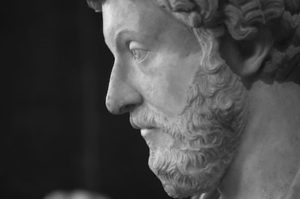A toxic political discourse is devastating to civil society
 What is the state of our political discourse? Emotional. Irrational. Tribal. Toxic. None of these adjectives bode well for cultivating a healthy political culture and discourse. We now live in a political culture filled with name calling, insults, and threats, with everyone having their favorite echo chamber to scurry to when their worldview is challenged.
What is the state of our political discourse? Emotional. Irrational. Tribal. Toxic. None of these adjectives bode well for cultivating a healthy political culture and discourse. We now live in a political culture filled with name calling, insults, and threats, with everyone having their favorite echo chamber to scurry to when their worldview is challenged.
A toxic political discourse is devastating if you’re trying to uphold the pillars of a democracy.
Fortunately for us, ideas more than 2,000 years old from Stoic philosophers can help teach us to calm our minds, clear our heads, and begin a path to rationalism again. By utilizing these lessons, we can help tear down political toxicity – then reopen ourselves and society to rational political discourse.
1. “As long as you live, keep learning how to live.” – Seneca
Go through life as a student. Treat every person or idea as a potential teacher to learn from. Even an idea or a person you disagree with can teach you valuable nuggets of knowledge.
Humility is the key to going through life ready to learn.
2. “If you are pained by any external thing, it is not this thing that disturbs you, but your own judgment about it. And it is in your power to wipe out this judgment now.” – Marcus Aurelius
Other political positions are not the cause of our disturbance; it’s the judgment of those viewpoints.
We should consider wiping away our immediate judgments. Not only will a better political discourse take place, but doing so can also save us from unnecessary anger and anxiety.
3. “The nearer a man comes to a calm mind, the closer he is to strength.” – Marcus Aurelius
A major pillar of stoicism is not allowing yourself to be enslaved by your emotions. Aurelius argued that allowing your mind to emotionally react to the opposition is a sign of weakness. Allowing yourself to be overcome by emotion is to surrender reason.
These emotional reactions are the fuel of our toxic political environment. A display of anger at the ideas of your political opposition doesn’t do anything to address the flaws in their stances.
4. “We should always be asking ourselves: ‘Is this something that is, or is not, in my control?'” – Epictetus
Part of our political toxicity stems from a false belief that we can force someone else to hold our political positions.
What can we control? First, we can stay calm in our conversations, listening and digesting the opposing words rather than immediately reacting. Second, we can stay open-minded. At the very least this will allow us to better understand opposing positions so that we can then learn how to address those points rationally and thoughtfully.
Stop trying to change a person’s view. Focus on what you can control––only then can you get someone to question their position.
5. “Those who receive the bare theories immediately want to spew them, as an upset stomach does its food. First, digest your theories and you won’t throw them up. Otherwise, they will be raw, spoiled, and not nourishing. After you’ve digested them, show us the changes in your reasoned choices, just like the shoulders of gymnasts display their diet and training, and as the craft of artisans show in what they’ve learned.” – Epictetus
This helps break down the root of our toxic political environment––everyone is trying to create this persona of the ‘enlightened’ political person.
We go and read political theories from our favorite talking heads and immediately want to repeat them to the world at large, spewing (essentially, repeating) that opinion all over social media.
We need to stop acting knowledgeable and instead become knowledgeable.
6. “We have two ears and one mouth so that we can listen twice as much as we speak.” – Epictetus
Consume. Consume. Consume. Learn as much as you can before putting your ideas forward.
By allowing ourselves to listen to many opinions, ideas, and perspectives before forming our own we can create better discourse and abate political tribalism.
7. “If you judge, investigate.” – Seneca
Today we have social media, constant news cycles, and an internet riddled with clickbait headlines, making the consumption of information virtually constant.
Seneca is teaching us to fully understand your opinion and the information before forming a strongly-held belief. Forming a stance on current affairs after reading a couple headlines and then sharing on social media can do more harm than good.
Take a step back and investigate if you truly want to understand the issues.
Written by Brenden Weber for the Foundation for Economic Education ~ November 9, 2018
FAIR USE NOTICE: This site contains copyrighted material the use of which has not always been specifically authorized by the copyright owner. We are making such material available in our efforts to advance understanding of environmental, political, human rights, economic, democracy, scientific, and social justice issues, etc. We believe this constitutes a ‘fair use’ of any such copyrighted material as provided for in section 107 of the US Copyright Law. In accordance with Title 17 U. S. C. Section 107, the material on this site is distributed without profit to those who have expressed a prior interest in receiving the included information for research and educational purposes. For more information go to: http://www.law.cornell.edu/uscode/17/107.shtml
